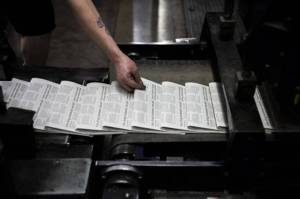Comment: Costs of overturning Roe will be borne by poor women
Published 1:30 am Saturday, May 14, 2022
By Julianna Goldman / Bloomberg Opinion
You wouldn’t think a hearing of the Senate Banking Committee would turn into a debate over abortion rights. But overturning Roe vs. Wade would have real costs for the U.S. economy, and Treasury Secretary Janet Yellen was entirely correct to note them in a tense and revealing exchange on Tuesday with Sen. Tim Scott, R-S.C.
Limiting or eliminating access to abortion “would have very damaging effects on the economy and would set women back decades,” Yellen said. Scott replied that framing abortion rights around women’s labor force participation and economic stability “seems harsh and callous.”
“This is not harsh. This is the truth,” responded Yellen, the former chair of the Federal Reserve. “Denying women access to abortion increases their odds of living in poverty or need for public assistance.”
“I’ll just say that as a guy raised by a Black woman in abject poverty, I am thankful to be here as a United States senator,” Scott said.
Scott misses the point. Yellen isn’t saying he shouldn’t be alive. She’s not saying that poor women don’t deserve to have children. She’s pointing out that limiting access to abortion will primarily affect poor and vulnerable women and women of color, who will no longer have the autonomy to make reproductive choices based on whether they can afford it.
And that’s in no small part because conservative lawmakers have tended to oppose policies that would support women when they do have children, such as subsidies for child care or universal paid family and medical leave. They also voted against the Build Back Better bill, which included family and medical leave as well as a permanent expansion of the child tax credit.
If you ban abortions, says Caitlin Knowles Myers, an economics professor at Middlebury College, “you will see more affluent women travel to obtain and the poorest of poor women unable to attain them.” As a result, she says, there could be upward of 75,000 unplanned births in the year following a reversal of Roe.
Myers’s calculation is based in part on where abortion providers are located and which states are likely to ban or limit abortion. She says about half of U.S. women of reproductive age live in counties where average travel distances to a provider will increase from 33 miles to 282 miles. Of the 25 percent of women who won’t be able to travel, about 75 percent will give birth as a result.
She asks a question: “Once we determine that limiting abortion access is going to cause a subset of women — primarily poor and vulnerable ones — to become mothers when they did not feel prepared to do so, then what happens next?”
When someone has a baby, they aren’t paid to take time off to care for it. The United States is the only rich country in the world without any form of national paid leave, leaving it up to employers and states. Of the 26 states that the Guttmacher Institute says are certain or likely to ban abortion, none offers paid family leave. According to figures from the Bureau of Labor Statistics, only 8 percent of low-wage workers have access to some form of paid leave.
The result is that 1 in 4 women in the U.S. returns to work within two weeks after childbirth; despite the recommendation of the American College of Obstetricians and Gynecologists that they take at least six weeks away from work.
The expense of raising children is a strain on low-income families. As former Treasury Secretaries Robert Rubin and Jacob Lew point out, 35 million families were receiving up to $300 under a pandemic-era expanded child tax credit, keeping roughly 3.7 million children out of poverty. But that assistance expired in December, causing child poverty to rise 41 percent.
And what about child care, which allows parents to work so they can support their families? The desperate need for it — and its exorbitant cost — have only become more apparent during the pandemic. Again, the U.S. is an outlier among the developed world, spending just 0.2 percent of its GDP on child care for children 2 and under. This amounts to a paltry $200 a year for most families. In the U.S., the average cost is $1,100 per month.
According to one report, in 2020 average child-care costs for kids younger than 5 in the U.S. were between 17 percent and 20 percent of an average worker’s earnings. In Scott’s South Carolina, a state that Guttmacher lists as certain to ban abortion if Roe is overturned, infant child-care costs increased 23 percent from 2018 to 2020.
It’s clear why Scott didn’t want to draw attention to the economics of overturning Roe: As Yellen noted, they would be devastating, and meanwhile he and his Republican colleagues oppose many policies that would improve women’s lives. Women would not only be denied the choice of whether to have a child, they would also lack access to services that could help them, their children or their future children.
That seems harsh and callous.
Julianna Goldman is a Bloomberg Opinion columnist who was formerly a Washington-based correspondent for CBS News and White House correspondent for Bloomberg News and Bloomberg Television.


